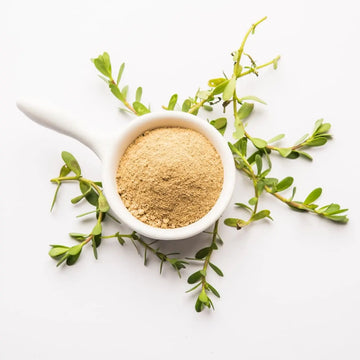Moringa - a superfood full of health properties
What is moringa?
Moringa , also known as moringa oleifera , is a plant with extraordinary health properties that have attracted the attention of scientists and healthy lifestyle enthusiasts. But what exactly is moringa? Let's take a closer look at this plant, its origins, characteristics and uses. Moringa oleifera is a species of plant from the Moringaceae family, origin reaches areas of South Asia such as India, Pakistan, Bangladesh and Afghanistan. Nowadays, moringa is also cultivated in Africa, Latin America and the Caribbean, thanks to its nutritional and medicinal values. The plant is drought-resistant and can grow in various types of soil, making it easy to grow and accessible to a wide range of people.
Moringa tree , also called horseradish tree due to the taste of its leaves, it can reach a height of up to 12 meters. It is characterized by branches covered with small, green leaves and white, intensely fragrant flowers. Moringa fruits are in the form of long pods, in which there are seeds. All parts of the moringa tree, such as leaves, flowers, seeds or roots, are edible and used in various areas of life.
Health benefits of moringa
Moringa properties health benefits are incredibly rich and diverse, which is why this plant is becoming increasingly popular around the world. Moringa's properties include anti-inflammatory, anti-diabetic, antibacterial, antiviral, and anti-cancer effects. In this article, we will take a closer look at the health-promoting properties of moringa and its use in natural medicine.
Moringa - a wealth of vitamins and amino acids
Moringa contains vitamins such as vitamin A, vitamin C, vitamin E, B vitamins and vitamin K. In addition, Moringa contains amino acids , including all 9 essential amino acids, which must be supplied with food because the body cannot produce them on its own. Moringa rich in ingredients nutrients such as protein, fiber, calcium, magnesium, potassium, iron, copper, zinc and phosphorus, which makes it an excellent source of energy and building material for our body.
How does moringa beneficially affect our body?
Moringa has a beneficial effect on our body in many ways. First of all, thanks to its anti-inflammatory properties, moringa can help fight inflammatory diseases such as rheumatoid arthritis or Crohn's disease. How does moringa work for diabetes? Studies have shown that moringa can lower blood sugar levels and improve insulin sensitivity, which is key for people with type 2 diabetes. Moringa action antibacterial and antiviral properties mean it can be used as a natural agent supporting the fight against bacterial and viral infections, such as influenza.
Moringa and immunity - how does it work?
Moringa immunity supports through its richness in vitamin C, which is a key component of the immune system. Vitamin C helps in the production of white blood cells, which are responsible for fighting infections and supports the functioning of the mucous barrier, which is the first line of defense against pathogens. Moringa health It also helps with heart health by lowering LDL cholesterol (the so-called "bad" cholesterol) and supporting the production of nitric oxide, which dilates blood vessels and improves circulation.
Moringa in natural medicine
Moringa natural medicine uses in a wide range, due to its numerous health-promoting properties. Moringa is used as a natural painkiller, anti-inflammatory, antidiabetic, antibacterial, antiviral and anticancer agent. In addition, moringa can be used as a digestive aid, improving the functioning of the liver, kidneys and nervous system. In natural medicine, moringa is also used as a means of strengthening the immune system and improving the overall condition of the body.
Moringa as a superfood
Moringa superfood is one of the most valuable and versatile superfood products available on the market. Compared to other superfoods, moringa stands out not only for its wealth of vitamins, minerals and amino acids, but also for its wide range of health-promoting properties. In this article, we will look at moringa as a superfood and its nutritional value in various forms.
Fresh moringa leaves vs dried moringa leaves - comparison of nutritional values
Fresh moringa leaves and dried moringa leaves They differ slightly in terms of moringa nutritional value . Fresh leaves are richer in vitamin C, but drying the leaves allows for longer storage and easier use in the daily diet. The nutritional value of dried moringa leaves is still impressive, they contain a large amount of protein, fiber, vitamins and minerals such as calcium, magnesium, potassium, iron and zinc.
Moringa powder - what are its properties?
Moringa powder , or Powdered moringa leaves are a convenient way to consume this superfood. Moringa leaves properties are preserved in powder form, which allows you to easily add moringa to smoothies, yogurts, salads or other dishes. Moringa powder is rich in protein, fiber, vitamins, minerals and antioxidants that support health and immunity.
Moringa in the diet - what does it taste like and how to use it?
What does moringa taste like ? Moringa has a delicate, slightly nutty flavor that may resemble spinach or arugula. How to use moringa in your diet? Moringa can be consumed in various ways, such as as an addition to salads, smoothies, yogurts, soups or main dishes. Here are some examples of using moringa in your diet:
- Add moringa powder to your fruit and vegetable smoothie
- Sprinkle fresh moringa leaves over salad or sandwiches
- Mix moringa powder with natural yogurt and honey
- Use dried moringa leaves as a seasoning for soups, stews or risottos.
It is worth experimenting with moringa in the kitchen to discover your favorite ways to consume it and enjoy its health-promoting properties.
Moringa as a dietary supplement
Moringa supplementation is gaining more and more popularity as dietary supplement due to its numerous health-promoting properties. Moringa dietary supplements are available in various forms, such as capsules, tablets, and powdered moringa leaves. In this chapter, we will discuss the use of moringa as a dietary supplement and its effect on weight loss, contraindications, and how to use it.
Moringa and weight loss - does it really help?
Many people wonder whether moringa weight loss is it true or myth. Moringa contains a large amount of fiber, which makes you feel full and can help control your appetite. In addition, moringa is rich in vitamins and minerals that support the proper functioning of the body, which can contribute to weight loss. However, it is worth noting that moringa loses weight only when used as a supplement to a healthy, balanced diet and physical activity. Taking moringa alone without changing your eating habits and lifestyle will not bring the expected results in weight loss .
Moringa - contraindications and side effects
Although moringa is considered a safe dietary supplement for most people, there are some moringa contraindications that are worth considering before starting supplementation. Moringa Contraindications include:
- Pregnancy and breastfeeding - due to the lack of sufficient research, it is not recommended to use moringa during pregnancy and breastfeeding.
- People taking anticoagulant drugs - moringa may affect blood clotting, which may increase the effect of anticoagulant drugs
- People with diabetes - moringa may lower blood sugar levels, which may affect glycemic control in people with diabetes
If you experience side effects such as nausea, headaches or digestive problems, consult your doctor or pharmacist.
How to use moringa as a dietary supplement?
Use moringa as a dietary supplement can bring many health benefits. To achieve optimal results, it is worth paying attention to several aspects:
- Dosage - The recommended dose of moringa may vary depending on the form of the supplement and your individual needs. Always follow the manufacturer's recommendations or consult your doctor for dosage.
- Quality - it is worth choosing moringa from trusted sources to be sure of its quality and composition.
- Regularity - to achieve the best results, moringa should be used regularly, according to the manufacturer's recommendations.
Summary
In this article we discussed moringa - a superfood full of health properties. We presented its origin, use in industry, natural medicine and cosmetics. We also discussed its nutritional value, effect on the body, and use as a dietary supplement. Moringa is rich in vitamins, minerals and amino acids that have a beneficial effect on our health. However, it is worth remembering that moringa will only bring the expected effects when used as a supplement to a healthy, balanced diet and physical activity. Before starting moringa supplementation, it is also worth checking any contraindications and consulting a doctor or pharmacist.



